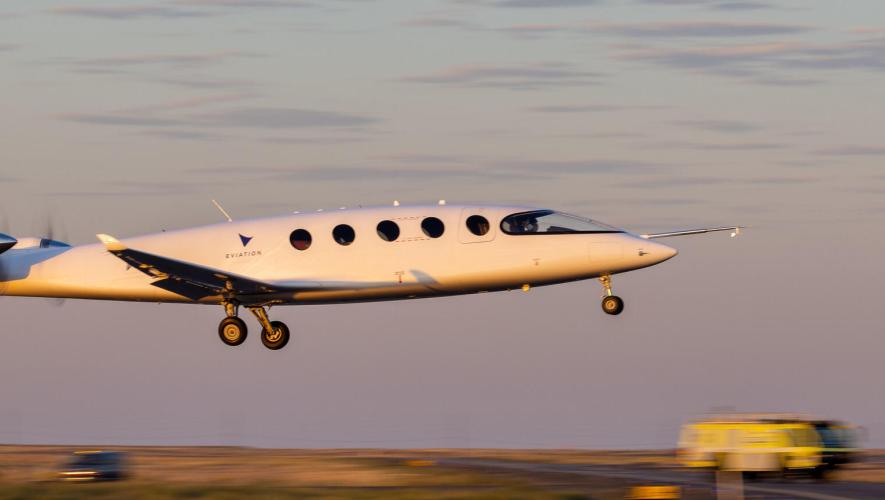Latest FutureFlight Videos
All Videos
FUTURE FLIGHT
Sign up for our free newsletter
News and analysis covering cutting-edge aviation technology and business models, including zero-carbon propulsion, eVTOL aircraft, automation and autonomy, and new infrastructure.
FutureFlight News
FutureFlight
Skyports Opens 'Living Lab' Passenger Terminal at Joby's eVTOL Test Base
The mobile facility will be used to determine how to optimize the experience of passengers traveling in eVTOL aircraft, as well as to demonstrate the operating concept to stakeholders around the U.S., including members of the public.

FutureFlight
Aura Aero Gathers More Commitments for Electric Regional Aircraft
The latest letters of intent from nine prospective operators of the hybrid-electric aircraft include the first for VIP and cargo versions of the design.

FutureFlight
China's AutoFlight Appoints U.S. Leadership Team for Prosperity eVTOL Aircraft
Omer Bar-Yohay, founder and former CEO of Eviation Aircraft, has become AutoFlight's president, and Joby's head of business development, Chad Cashin, is joining as chief commercial officer.

FutureFlight
How New Training Devices Could Fast-Track Pilots Into eVTOL Aircraft
The emerging advanced air mobility sector expects to need thousands of pilots to operate new eVTOL aircraft and faces a recruitment and training challenge at a time when flight crew are already in short supply.

FutureFlight
Kite Gets Funding for Electric Motor Based on Improved Magnetic Material
The Australian start-up says its material retains energy 10 times more effectively than current alternatives and will support smaller, lighter, and more efficient electric power sources for aircraft.

FutureFlight
Wisk Aero Unveils Four-Seat Autonomous eVTOL Air Taxi
Wisk Aero has revealed the design of its sixth-generation eVTOL air taxi, a fully autonomous and all-electric aircraft that can transport four passengers up to 90 miles.

FutureFlight
EHang Reports Progress With Type Certification of Autonomous EH216-S eVTOL Aircraft
The company says that Chinese aviation safety regulators have now approved the Project Specific Certification Plan and that compliance testing will be stepped up in October.

FutureFlight
GlobeAir Agrees to Add a Dozen Lilium Jets to Its European Private Charter Fleet
The agreement with the Austrian company is more evidence of growing interest in eVTOL aircraft in the business aviation industry.

FutureFlight
Battery Pack Pioneer Sets Sights on Leading Role in Electric Aviation
EP Systems expects its Epic energy storage system to be in use on around 14 aircraft types in 2023, including Ampaire's EcoCaravan hybrid-electric conversion model.

FutureFlight
Textron Partners with ZeroAvia to Convert Grand Caravan Aircraft to Hydrogen Propulsion
The companies see a market to retrofit some of the 2,400 turboprop utility aircraft already delivered worldwide under a supplemental type certificate for the 600-kW ZA600 powertrain.

FutureFlight On The Radar
Daedalean Publishes Roadmap for Autonomous Flights by 2028
The start-up outlines its path to developing self-flying aircraft.
FutureFlight
Sabrewing's Rhaegal Uncrewed Cargo Aircraft Makes First Flight with Improved Propulsion System
The first RH-1-B production aircraft is now expected to be delivered in December 2023, with the first customer set to be the UN's World Food/World Health program.

FutureFlight
Lilium Reports Full Transition Flights with eVTOL Aircraft Technology Demonstrator
Its Phoenix 2 test aircraft achieved full transitions between vertical and horizontal flight at speeds of around 100 kt during testing in Spain.

FutureFlight
MintAir Set To Employ Electra's eSTOL Aircraft for Korean Regional Flights
The new operator says the model's short-takeoff-and-landing capability and range of 800 miles will mean it can reach anywhere in Korea from its base at Seongnam City, near the capital, Seoul.

FutureFlight
Eviation's Alice Electric Aircraft Starts Flight Test Campaign
The battery-electric model is intended to carry up to nine passengers on flights of around 500 miles, and the manufacturer now aims for it to enter commercial service in 2026.

Regulations and Government
FAA Paves Way for AAM Use with Vertiport Standards
The FAA said the standards are interim and would change over time as more data is gathered about eVTOLs and their operations.

FutureFlight
Vertical's VX4 eVTOL Aircraft Prototype Makes First Hover Flight
An initial tethered takeoff marks the start of extensive flight testing for the four-passenger vehicle, which is expected to enter service with several major international airlines.

FutureFlight
With New Funding, SkyDrive Unveils Two-Seat, Short-hop eVTOL Aircraft
The Japanese start-up's SD-05 all-electric vehicle is expected to operate congestion-busting flights of up to just 10 kilometers, when it begins air taxi services at the World Expo 2025 in Osaka.

FutureFlight
Disjointed U.S. and Europe Could Lose Advanced Air Mobility Leadership to Asia, Warns eVTOL Leader
Michael Cervenka, president of UK-based eVTOL aircraft developer Vertical Aerospace told Honeywell's Air Mobility Summit that there must be alignment on policy, regulation and global collaboration.

FutureFlight
Chicago Gets a Preview of an Urban Air Mobility Future, with India Next
Working with helicopter charter flight group Blade, Eve conducted a simulation of what its eVTOL aircraft could do for travelers in the sprawling U.S. city and its suburbs. Blade plans to add eVTOL vehicles to its network in America and India.










